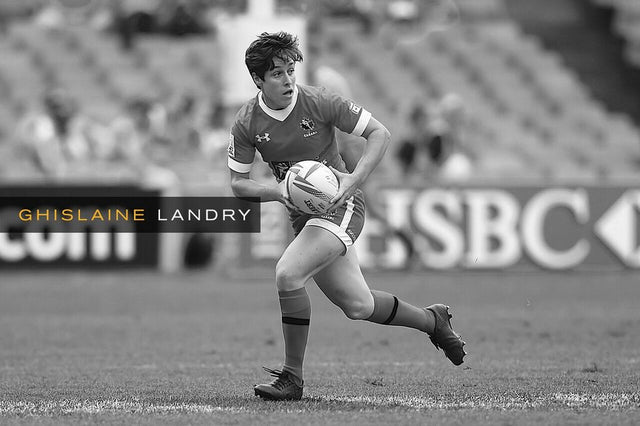Profile: Mighty Ghislaine Landry, Sevens Dynamo
Written By: Mark Janzen
Photos By: Ian Muir / Paige Stewart
At first, Ghislaine Landry doesn’t exactly describe the sevens game in the most appealing terms.
“Sevens is a gut-busting game,” says the captain of Canada’s women’s sevens team. “No matter how fit you are, it hurts.”
She goes on:
“Right from the start, you’re just gasping for air.”
Then, she gets to the pay off:
“But when things go well, it’s just the greatest feeling.”
Two weeks ago, when Canada finished a disappointing fourth in Dubai to open the 2017-18 World Rugby Women’s Sevens Series, the former was there, as it always is. But the latter proved sporadic.
 For Landry, the all-time World Series points leader and one of three nominees for the World Rugby Women’s Sevens Player of the Year for 2017, there’s not much she hasn’t seen on the circuit. While it was certainly a disappointing start – coach John Tait articulated the feeling rather bluntly in his post-tournament comments: "(We’re) not pleased with fourth at all” – one can bet Landry will work harder than ever to help the team bounce back. That’s what you get from a player who enjoys the “gut-busting game.”
For Landry, the all-time World Series points leader and one of three nominees for the World Rugby Women’s Sevens Player of the Year for 2017, there’s not much she hasn’t seen on the circuit. While it was certainly a disappointing start – coach John Tait articulated the feeling rather bluntly in his post-tournament comments: "(We’re) not pleased with fourth at all” – one can bet Landry will work harder than ever to help the team bounce back. That’s what you get from a player who enjoys the “gut-busting game.”
In her team’s preparations for Dubai, Landry looked forward to the season, saying, “we’re always evolving and learning from the past.”
And if Canada is to earn the series title that so far has eluded the women’s contingent – a lofty goal that Landry and her teammates have eyes on achieving this year – that’s exactly what they’ll have to do.
But for Landry, the “evolving and learning” part has long been part of her DNA.
- - -
There was a time when Landry was told she was simply too small for the international game. That was before the sevens competition took off, back when the 5-foot-4 Toronto product was pining for a place in the fifteens game. Indeed, she was twice named the Player of the Year within the Canadian university fifteen context while playing at St. Francis Xavier University (2006 to 2010), but her size was consistently a question mark at the senior level.
However, her goal of playing at rugby’s highest level never wavered.
“It was something that I loved to do and I stuck with it,” she says.
Then, the door to the sevens game opened. And when rugby sevens officially joined the Olympic programme and the opportunity to be a full-time athlete arose, Landry took her chance. Five years on from Canada’s first year of full-time centralization in 2012, she has developed into one of the best women’s sevens players to ever play the game.
“It’s a really challenging game,” says Landry, who regularly makes it look quite the opposite. “Right from the start, you’re working so hard. On top of that, you’re trying to keep it together mentally and play well. It’s a big challenge and that’s why I love it so much.”
Last year, the speedy Landry was the series’ top point-scorer for the third year in a row, collecting 269 points over six events, which helped her to the top of the all-time scoring heap (currently on 875 points). The subsequent Player of the Year nomination solidified her place as one of the game’s very best.
“That’s not why we’re doing what we’re doing and that’s never a focus, but it is a nice honour to be recognized by World Rugby,” says Landry, who ultimately saw New Zealand’s Michaela Blyde win the award. “For me, it’s a team game and I’m working hard for my teammates and our program and they’re doing just the same for me, so without that none of this is possible.”

Before Dubai, Landry was blunt.
“We’re really pushing to win the World Series title this year. For us, it’s now do or die.”
Now, after finishing fourth in the series-opener, the task is just a little bit taller. But Landry is keenly aware of the hump they must overcome.
“It’s that last two minutes of games when we need to keep our focus and do what we do best,” says Landry, whose team won’t be back in action until the series goes to Australia Jan. 26-28.
“You’re lacking oxygen in the final minute, but we need to be able to finish those games and have the confidence to do that. And we just need to continue to build that self-belief.”
And that self-belief is something Landry knows well.
Playing the fifteens game early in her career, she wasn’t supposed to have success.
Frankly, stumble into Landry in a coffee shop and her slight build might have you questioning her profession all together.
Fortunately for Canada, Landry never had those questions. She kept finding ways to succeed.
“When sevens centralized everything fell into place (for me). And once I’m in something – and I was 100 per cent in – I am going to try to be the best I can at it.”
See that box. Check.


